

Make it your new school your resolution #teacher5aday #marking. OpenDocument. This short video for parents about the new KS2 tests may be useful to share via school websites, facebook pages, etc. @bethben92 @stefguene here you go happy for you to share but could you ref me if you do. Thanks. Helen Hindle sur Twitter : "@treezyoung @grahamandre @rondelle10_b self reflection / assessment at the end of a lesson or unit of work. Michael Tidd sur Twitter : "Changes to the National Tests and what you need to know: KS1: KS2: My @risingstarsedu articles" Alex Bedford sur Twitter : "“@MaryMyatt @GiftedPhoenix not forgetting breadth, depth and pace... via @jpembroke”" Mary Myatt sur Twitter : "'I'm looking at you Emerging, Developing, Secure. Is this really assessment without levels?' via @jpembroke"
A quick-reference guide to changes in the National Tests and what you need to know - Assessment solutions and advice for primary schools. Thanks to Deputy Head Michael Tidd for researching and writing this article, which we hope will be a great time-saver for our readers!
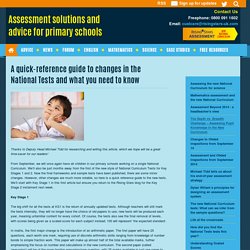
From September, we will once again have all children in our primary schools working on a single National Curriculum. We’ll also be just months away from the first of the new style of National Curriculum Tests for Key Stages 1 and 2. Now the final frameworks and sample tests have been published, there are some minor changes. However, other changes are much more notable, so here is a quick reference guide to the new tests. We’ll start with Key Stage 1 in this first article but ensure you return to the Rising Stars blog for the Key Stage 2 instalment next week. Key Stage 1 The big shift for all the tests at KS1 is the return of annually updated tests.
In maths, the first major change is the introduction of an arithmetic paper. The new addition to KS1 is the grammar, punctuation and spelling test. Questioning training - Geoff PettyGeoff Petty. Good questioning creates full student participation, and checks and corrects everyone’s learning.
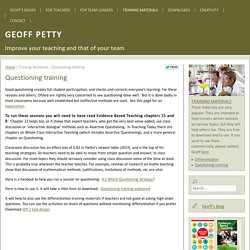
For these reasons and others, Ofsted are rightly very concerned to see questioning done well. But it is done badly in most classrooms because well established but ineffective methods are used. See this page for an explanation. To run these sessions you will need to have read Evidence Based Teaching chapters 15 and 9. Chapter 22 helps too, as it shows that expert teachers, who get the very best value added, use class discussion or ‘interactive dialogue’ methods such as Assertive Questioning. Classroom discussion has an effect size of 0.82 in Hattie’s newest table (2013), and is the top of his teaching strategies.
Questioning; Challenge & Engagement. Questioning is a fundamental element of pedagogy, one you could read endlessly around, but the reality is using questioning to challenge and engage all learners is demanding and potentially problematic to get right.
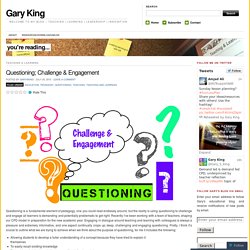
Recently I’ve been working with a team of teachers, shaping our CPD model in preparation for the new academic year. Engaging in dialogue around teaching and learning with colleagues is always a pleasure and extremely informative, and one aspect continually crops up; deep, challenging and engaging questioning. Firstly, I think it’s crucial to outline what we are trying to achieve when we think about the purpose of questioning, for me it includes the following: Making the assumption that we are all familiar with Blooms Taxonomy; a cognitive approach to to classify forms and levels of learning, research has shown that as teachers we tend to ask questions in the “knowledge” category 80% to 90% of the time. Active engagement.
The Feedback Compendium. The Assessment Commission Report – 13 key points. It’s not often I speed read through a government document, but the Assessment Commission report, leaked this morning, made for a fascinating read.
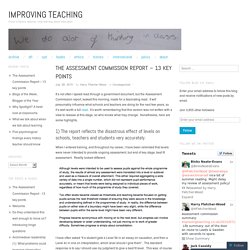
It will presumably influence what schools and teachers are doing for the next few years, so it’s well worth a full read. It’s worth remembering that this version was not written with a view to release at this stage, so who knows what may change. Nonetheless, here are some highlights. 1) The report reflects the disastrous effect of levels on schools, teachers and students very accurately. When I entered training, and throughout my career, I have been reminded that levels were never intended to provide ongoing assessment, but end of key stage, best fit assessment. I have often asked “If a student gets a Level 5b in an essay on causation, and then a Level 4c in one on interpretation, which level should I give them”. Leaked report claims schools are trying to recreate levels for new national curriculum.
Schools are trying to recreate levels assessment systems based on the new national curriculum, a leaked version of a delayed report set up to help teachers plan for life after levels has found.
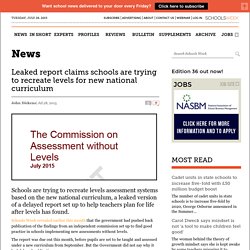
Schools Week revealed earlier this month that the government had pushed back publication of the findings from an independent commission set up to find good practice in schools implementing new assessments without levels. The report was due out this month, before pupils are set to be taught and assessed under a new curriculum from September. But the Government did not say why it had delayed publication. However a leaked version of the draft report, published by the Guardian today, shows the commission had some potentially awkward findings for the government. Commission chair John McIntosh said in the report: “The system has been so conditioned there is considerable challenge in moving away from them [levels]. Assessmentcommissionjune15-1.docx.
The Wroxham School Assessment Policy. The NCETM sur Twitter : "NCETM publishes new materials to support assessment of pupils’ understanding of the mathematics National Curriculum.